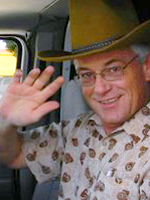Bittersweet birthday for an ill-run city
By Leon Worden
Friday, December 17, 1999
| I |
On the plus side, we’ve got a really cool Cowboy Poetry Festival to show for those 12 years, and some nice trails and parks (though still not enough), and an
It still takes a
Perhaps the best thing cityhood has done is to give local residents a local forum for airing their concerns.
Or has it?
I don’t remember how many times in the last 12 years the City Council has been called on the carpet for violating the state’s
The latest violation hearkens back to the earthquake of 1994 and all the closed sessions when the City Council, at Caravalho’s prodding, pursued a massive, $1.1 billion redevelopment plan that City Attorney Carl Newton knew, or should have known, was illegal. As expected, the City Council had its collective butt kicked in state court, but only at a cost of hundreds of thousands of taxpayer dollars.
Today in Sacramento, the words “Santa Clarita” are still used derisively and jokingly whenever a lawmaker proposes a change to the state’s redevelopment law that might be abused by a city.
While the most recent incident may not prove to be as costly to taxpayers as the redevelopment debacle or as devastating to our valley’s quality of life as the rejection of a
One, it is a breach of the public trust, because the council told the public one thing and did another. Two, it is an illegal expenditure of public funds because the council secretly voted to provide publicly funded documents and staff time to a private party and didn’t tell anyone about it.
To recap, over the summer the council voted not to sue the Castaic Lake Water Agency, Santa Clarita’s state water wholesaler, over its recent acquisition of the Santa Clarita Water Co., one of the four local water retailers. There may be valid reasons to support or oppose CLWA’s purchase of the water company, and the city might have been within its rights to sue. But it voted not to— and, importantly, it told the public it wouldn’t.
Then, on Sept. 7, behind closed doors, with Caravalho and Newton calling the shots, the council took a secret vote authorizing Newton to assist Councilwoman Jill Klajic’s attorney in Klajic’s own private lawsuit against CLWA and to “share” an extensive legal analysis that was initially prepared at city taxpayer expense.
And not only did they keep the vote secret, they even tried to cover it up by lying about it on the public record. Newton reported that “no action was taken” at the Sept. 7 meeting, when in fact an action was taken.
The city apparently violated the state’s
Focus on the word “intervene.” Newton says he “assisted,” “consulted” and “shared.” I’d hate to be in Newton’s shoes if he had to go before a judge and explain the difference.
As his excuse to take the council behind closed doors in the first place, Newton cited a section of the law that allows a
Another thing. Newton has repeatedly told council members that it is somehow illegal for them to discuss what goes on in closed session. It’s another lie. The law— which you can read for yourself online at www.the-signal.com/links/brownact.html— says no such thing. There may be instances in which it would be unwise for a council member to discuss a closed meeting, and instances where they aren’t required to, but the law doesn’t say they can’t. In fact, the law says the opposite: “The people, in delegating authority, do not give their public servants the right to decide what is good for the people to know and what is not good for them to know.”
It continues, “Each member of a legislative body who attends a meeting of that legislative body... where the member intends to deprive the public of information to which the member knows or has reason to know the public is entitled under this chapter, is guilty of a misdemeanor.”
To instruct the council otherwise is just one more way the city’s most senior staff members have consistently intimidated and manipulated their bosses— the members of the City Council.
Some months ago, George Caravalho’s spokeswoman asked me why I hate my city so much.
In response, I’m reminded of the citizens of former communist countries who used to say they love their country but hate their government.
I don’t hate my city. I love my city. I love my city so much that I am willing to fight for it. Leadership that is beyond lies and
©1999 LEON WORDEN — ALL RIGHTS RESERVED

